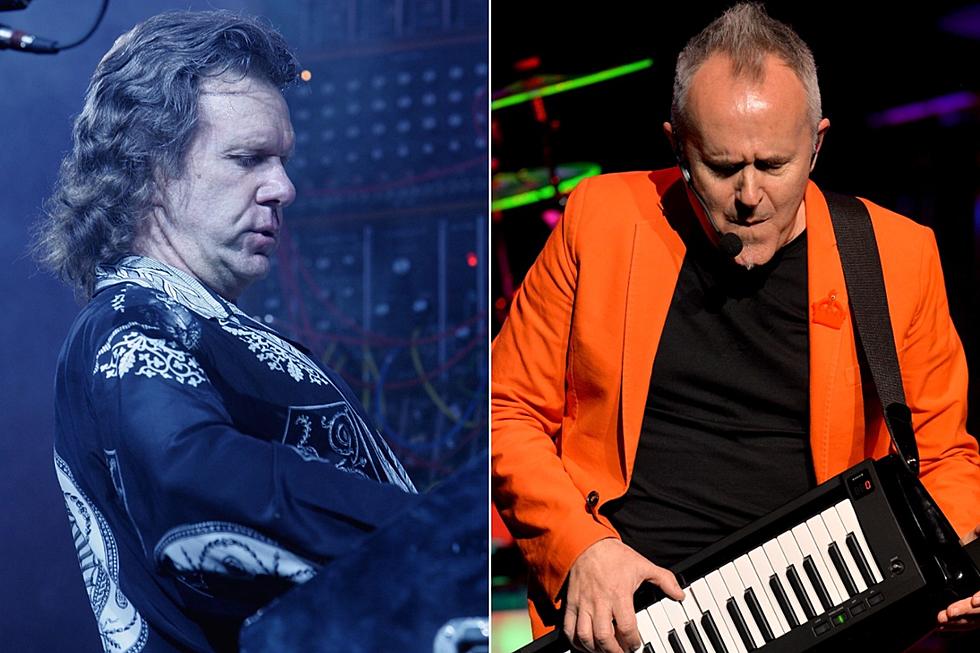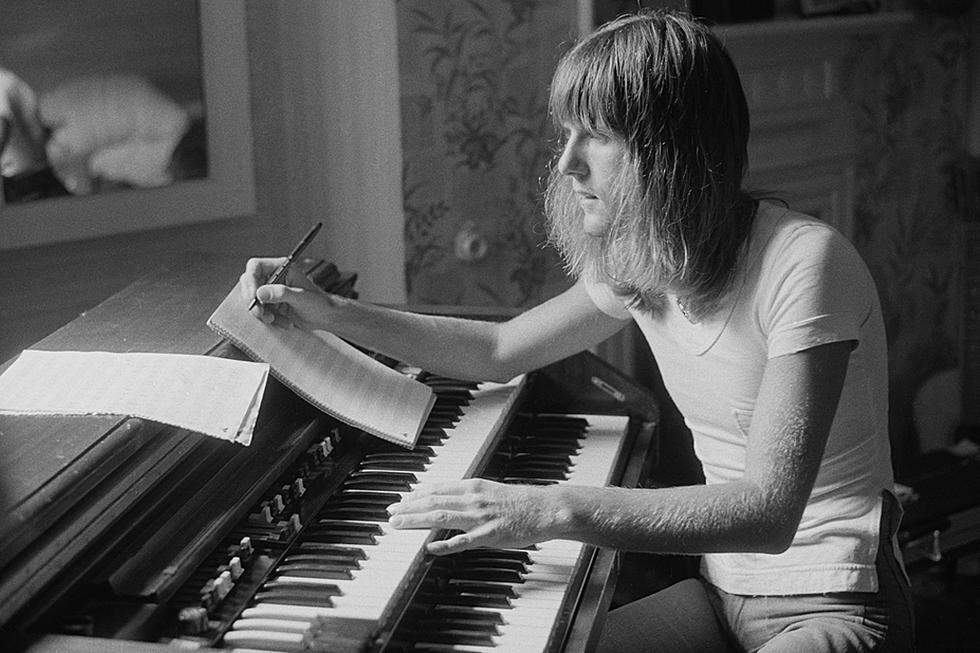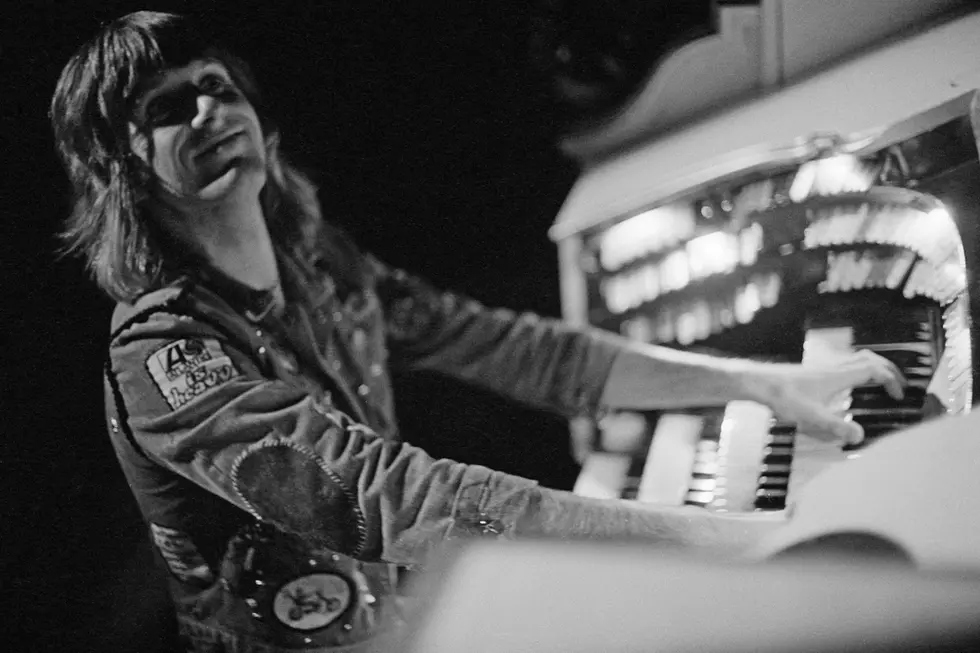
How Keith Emerson Inspired Synth-Pop Legend Howard Jones
Howard Jones had formidable experience worshiping at the altar of the keyboard gods. He heard everything from Genesis and Tony Banks to Stevie Wonder and Herbie Hancock.
The synth-pop wunderkind even shared the stage at the 1985 Grammy Awards with Wonder and Hancock at what became known as the "Synthesizer Showdown." The massive display of electronics featured the pair of legends, teamed up with Jones and his '80s counterpart Thomas Dolby as the relative newcomers.
But it was Keith Emerson who had the greatest impact on the musician in his years as a young music fan and developing player. "He seemed to come from the same sort of place," Jones shares during our conversation.
There are a lot of similar classic rock parallels in his career. He got to channel the Emerson influence directly while touring as a member of Ringo Starr's All-Starr Band in 2001. ("It's just heavenly to jam with him," he said of playing with Starr.)
He and Prince associate Sheila E. also united on that run for a version of "Karn Evil 9" by Emerson, Lake and Palmer with Greg Lake on vocals.
Jones' career is dotted with other classic rock encounters, including a collaboration with Phil Collins and eventually, even a summit with Emerson himself.
As Jones was preparing to go back out on the road with his acoustic trio, he beamed in via Zoom to discuss some of these choice moments from his career. He also shed light on his upcoming Live at Union Chapel release as well as plans for a new album that will be out this summer.
I know you got to play with Sheila E. during your time touring with Ringo. That seems like that would have been great.
She is absolutely fantastic. We played "Karn Evil 9" together, you know.
Amazing.
That was her, me and Greg Lake. The other guys in the band left the stage, so it was just the three of us. It's online somewhere, a recording of it. It's one of the highlights of my musical life.
Listen to Howard Jones, Sheila E. and Greg Lake Play 'Karn Evil 9'
You're such a big Keith Emerson fan. I can imagine there was a good amount of pressure.
It was absolutely such an amazing thing. I can tell you that it took me two months to learn it. [Laughs] It's got to be one of the hardest things to play for a keyboard player. I just put it into Logic and looped two bars and learned it two bars at a time. Obviously, I was really familiar with it anyway, but to be playing it with the right sounds and have to generate the sounds from my gear as well [required some extra work]. But it was brilliant to be playing that every night.
Playing it with Greg Lake added another layer of stress, I would guess.
I knew I had to really step up and be on the mark. You know, he's going to know. He'll know whether it's right or not! [Laughs] But we did it. He really loved it. Greg came to the house and we did talk about doing some more things together, to be honest. It didn't happen, unfortunately. He was getting quite ill by then. I don't think it was going to happen.
How did you first discover Keith?
You know, I was into Emerson before ELP. The Nice was a huge influence on me. They did a lot of live recordings and I can't remember all of them, but I used to listen to those over and over. The energy and craziness, especially when Emerson is rolling around the stage with his Hammond L-100, plucking the reverb coils and stuff.
That all sounds so great when it's live. You know, the whole room reverberates. I saw Emerson, Lake and Palmer play their first proper gig at Isle of Wight. They'd done a warmup [before that]. That was probably one of the best live things [I had a chance to see].
You were at that show. That's amazing.
I was at that show. I was like 14 or something. I shouldn't have been. I can't believe my parents allowed me to go, but I wasn't taking no for an answer. [Laughs]
Seeing the visual carnage Emerson was creating on stage had to be really fascinating.
Yeah, I mean, the knives, you know, sticking the knives in. But also, the knives were part of the musical side of it. Because he used to use them to hold droning notes down. He would play over the top of the drone. It was something else.
It was always Keith who was the man. He seemed to come from the same sort of place. I was classically trained, but yet my first love was pop music and rock music. But I had the chops to [do other things]. I related to him so much and also, his rock interpretation of classical music, I just thought that was so brilliant. I grew up on that. So he was the man. I would say him and Stevie Wonder, those two really had massive, massive influence on me.
Watch Keith Emerson Stab Knives Into His Organ in 1971
When did you finally meet up with Keith face to face?
Keyboard Magazine wanted Keith to come and interview me about my new record. It was for [Jones' 1989 album] Cross That Line. He came to the house to hang out with me for a whole day. [Laughs] He turned up on his big motorcycle with his leathers and everything. We just had such a great time. I can't tell you how good it was. I had my Hammond C3 set up in the studio and he played it. You know how he used to play it backwards from the other side?
Yeah!
Insane! It's like, how do you do that? He played some bits [of things] as well. But he mainly wanted to talk to me about the piano solo on that album. It's called "Out of Thin Air." That's what he really wanted to talk to me about. It all came back down to piano in the end, and I thought that was really interesting that he wanted to have this big focus on that track on the album. It was wonderful.
The pictures I have of me and him together are just so great. I'm just so sad and I miss him. It's so sad not to have him around. It's a tragedy, so many great people, we've lost them. I wish I could have met him when he was feeling so down, I really do. What an amazing person and player he was. He had a huge influence on so many people.
How did you come to know and work with Phil Collins?
We got to know each other through doing the Prince's Trust concerts. We really hit it off. I know Phil is a very gregarious guy anyway, you know, very likable. But I didn't expect for us to get on so well. I don't know why, but we did. I sent him the song ["No One is to Blame"], the version that we had done on [Jones' 1985 album] Dream Into Action, which I thought was great. The fans still prefer that version.
But I thought it could be something that could get on the radio. He agreed to do it and we did it in two weekends while he was making another Genesis album. The only thing he asked me to do was to program a two-bar drum machine pattern that he could play to. He always did that when he was doing his own solo records. I thought, "Oh God, Phil Collins has asked me to do this drum loop." So I spent 48 hours working on this drum loop! Obviously, it became one of the biggest hooks of the record. Phil absolutely loved it. He could pull stuff out of it and add stuff in.
My backing vocalists, a band called Afrodiziak, they were the most amazing singers. I asked them to come down and sing background vocals. It was just such a dream, making that. The piano, it was one take, the first take that I did. That was it. I remember them freaking out that I could do that. [Laughs] You know, because I think I was quite underestimated. But that's fun. It's fun to overcome that stuff. It was really, really wonderful. I persuaded him to sing on it as well. So it's got some harmonies from Phil.
Watch the Video for 'No One Is to Blame' Featuring Phil Collins
Was there ever talk about doing more than just the one track and writing together?
There was. I wanted him to do "Everlasting Love." He wanted to do it as well, but he ran out of time with all of the projects he was doing and he couldn't fit it in. I thought that was definitely genuine. I mean, we'd had massive success with our first collaboration, so I think "Everlasting Love" would have been amazing with him too. But it went on to be a big hit anyway, so I can't complain. It would have been great, wouldn't it, to have a Phil Collins produced version of it?
Absolutely! What's the latest on your next solo album?
It's called Dialogue and it's very electronic again. I'm doing some collaboration again with BT, who has become a really, really good friend. I think he's a genius, and it's a privilege to be working with him. I'm four tracks in, but I've got the other tracks written. I haven't finalized the vocals, but I'm going to get it ready for this summer. I'm very, very excited about it. It's sounding good. There's also a [collection of] piano compositions that's on the way.
I saw that. It looks really cool.
Yeah, this time, I didn't improvise it. I sat down and composed the pieces properly. I played it into the computer and then spent months editing it. I'm really excited about that too.
This new live album seems really special.
With COVID and everything, we had to keep pushing shows back. I had planned to do more shows with the trio in the U.K. I thought, "Well, this may be the only acoustic show we do for a long time." So I thought we’d better record it. The Union Chapel has the most amazing acoustics. For acoustic music, it really is a beautiful place to play. The natural reverb in the room is just fabulous. So I thought, "Yeah, let's record it."
We've got this new setup now that we can record every show with everything separate, so I was able to mix the whole thing myself. I spent weeks and weeks doing that to make it just the way I really wanted it to sound. But it's completely live. It was one of those magic nights where everything went right. The guys were amazing. We were fresh to it and we hadn't been playing for weeks and weeks, so there's a spontaneity about it. It's probably going to be one of my favorite records because of the energy. Of course, the energy of the audience gives you a buzz too.
It seems like it would be a really interesting process, going back to these songs and breaking them down acoustically.
Yeah, actually, there's a song on Dream Into Action called "Specialty." Fans really love that track, and they always request for me to do it. Having Nick play the bass line on that, it just sounds so good. Then we do a sort of float section, and that really suits the top end of the Chapman stick. I never would have thought that would be a song you'd do acoustically, but it really, really works.
It showed me that, really, if a song is well-written, you can do it in any way. We're doing things like "Hide and Seek," a totally different version, with a slow samba rhythm. You'd never think that song could be done that way. It's almost better than the original. Finding new ways to do the old material for me is a great time. I think the audience then gets a new perspective on something familiar. I think that's really fun.
Watch Howard Jones Perform 'Hide and Seek' at Union Chapel
Top 100 Classic Rock Artists
More From Ultimate Classic Rock









